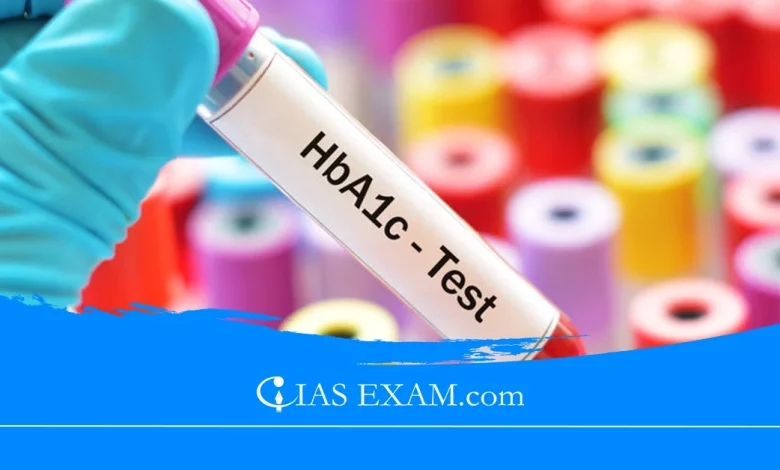Haemoglobin A1C Test in Diabetes Management
Syllabus: Science and Technology[GS Paper-3]

Context
India has a large number of people affected by diabetes, with around 10.13 crore individuals having the disease and an additional 13.6 crore classified as pre-diabetic. The HbA1C test is commonly used to diagnose and manage diabetes.
HbA1C Test
- The HbA1C( HbA1C) also known as the Glycated Haemoglobin(GHb) test is an essential factor in managing diabetes.
- This test determines the standard glucose level throughout the preceding two to three months, contributing useful information about means of long-term glucose control.
- HbA1c test analyses the amount of the haemoglobin in the blood that carries glucose in attachment. Haemoglobin is a globular protein found within erythrocytes which transport oxygen into all body tissues. When glucose has entered the bloodstream, it starts binding to do so with haemoglobin, getting glycated. The product is named HbA1C. The increased glucose content in the blood leads to the glucose binding to more haemoglobin which then again results in high HbA1c levels.
- Importance of the HbA1C Test
-
- Long-term Blood Sugar Control: Unlike other types of glucose tests that represent a single moment outcome, the HbA1C test results serve an average of blood sugar levels in more than a couple of months. It is therefore a vital tool for the evaluation of long-term blood sugar control. Colouring the world pollution-free
- Risk Assessment: It is very important to keep HbA1C in the desired range in order to diminish the risks of complications resulting from diabetes, such as cardiovascular disease, kidney disease, peripheral nerve damage and problems with eyes.
- Treatment Adjustment: The HbA1c results further help clinicians manage diabetes by adding dosage adjustment of medication, proper dietary counselling, and prescription of lifestyle modifications, to give patients an ideal blood sugar control.
- How is the HbA1C Test Performed?
-
- The HbA1C test can be performed using a blood sample obtained through a simple finger prick or venous blood draw.
- The sample is then sent to a laboratory for analysis. Results are typically reported as a percentage, with higher values indicating poorer blood sugar control.
How Haemoglobin A1C Test Helps in Diabetes Management ?
- The Haemoglobin A1C (HbA1C) test is very important in management of diabetes, because it helps the health care provider to see the level of long-term sugar in blood.
- This test checks the average blood glucose concentration that was in your body during the last two or three months, which is very useful for getting a handle on what the control level is like.
- The analysis of the level of HbA1C gives the health care providers the opportunity to review the effectiveness of the diabetes treatment, so they can modify therapy plans and have them successful.
- Maintaining the HbA1C levels towards the goals is of paramount importance to prevent the disease related problems, such as coronary heart disease, diabetic nephropathy, kidney failure, neurological problem or retinopathy.
- Further, the HbA1C test uniquely provides a base for more specific care, that considers factors like age, overall health status, and the presence of comorbidities.
- The educated patient, with knowledge about HbA1c results, can do more to determine their blood sugar levels and hence could make informed decisions to control the condition.
- The systematic checking of HbA1C is compulsory for the purpose of optimising diabetes treatment plans so as to improve long term health effects.
Conclusion
The Haemoglobin A1C (HbA1C) test is essential for managing diabetes effectively. It helps healthcare providers assess treatment efficacy, reduce complications, and empower individuals with diabetes to take control of their health. Regular monitoring of HbA1C levels is key to improving overall diabetes management and enhancing quality of life.
Source: The Hindu
UPSC Mains Practice Question
Discuss the significance of the Haemoglobin A1C (HbA1C) test in the management of diabetes. How does this test aid healthcare professionals and individuals with diabetes in achieving better glycemic control and reducing the risk of complications?





.png)



